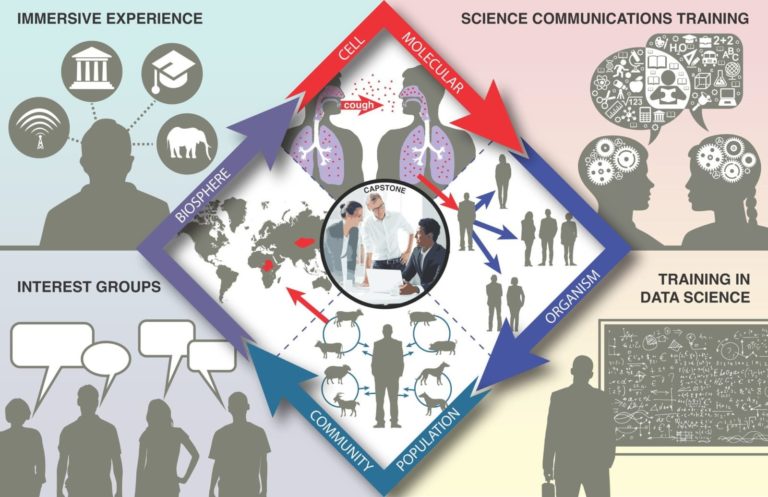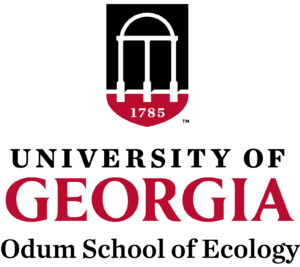A NEW APPROACH
The University of Georgia leads the charge in dynamic STEM education through a novel program of graduate study. Interdisciplinary Disease Ecology Across Scales (IDEAS) is a National Science Foundation supported Research Traineeship Program that trains PhD students in new ways to solve infectious disease problems occurring across different scale of biological organization.
This program integrates various biological disciplines as related to infectious disease and includes quantitative training, science communication, and professional development.
Graduates can expect to move fluidly and confidently throughout the academic and professional sectors. Our curriculum is oriented at effectively addressing the challenges related to infectious disease dynamics in changing environments.
Over the last few decades, major technological advances in areas such as molecular biology and computer science have created unprecedented opportunities for biologists to understand the inner workings of the smallest life forms on earth and simultaneously to investigate biological processes on global scales. A major challenge to educating biologists in the modern era is providing them with tools to move flexibly among these massively different scales of organization. An area of the biological sciences where such a cross-scale approach is particularly relevant is the study of infectious diseases, where, for instance, details of host-pathogen interactions occurring within a host at the level of the cell can contribute to the emergence of globally pandemic infections. To respond to the need for a scientific workforce that can address current and future challenges related to infectious diseases in the environment, the IDEAS program at the University of Georgia trains students in new ways to solve infectious disease problems occurring at the interface of different biological scales of organization. To do this, IDEAS combines innovative cross-scale biology education with advanced skill development in computer modeling and practical immersion in global infectious disease issues.

THE TRAINING EXPERIENCE
IDEAS devised a PhD curriculum comprised of the four essential objectives for scientific research.
- A strong conceptual foundation in infectious disease biology that spans the sub-cellular to biosphere scales
- Advanced technical and modeling skills that provide an analytical toolbox for moving fluidly across scales
- Transferable skills fostered through diverse professional development opportunities and communications training
- A global perspective on infectious disease issues
These learning objectives are achieved through a unique blend of interdisciplinary curricular elements, participation in professional development activities, and through independent and collaborative research.
THE SITE OF INNOVATIVE COLLABORATION
The University of Georgia is the ideal setting for transformative graduate training in infectious disease ecology. UGA has over 100 faculty working in the area of infectious diseases. These faculty, representing eight different schools and colleges, are members of a cross-campus umbrella group, the Faculty of Infectious Diseases, which promotes interdisciplinary and integrative disease research across campus.
Amidst this highly collaborative and dynamic atmosphere, the IDEAS program introduces a new model of student training that goes beyond all other pedagogical research methods found previously on campus. This focused program, structured on integrated research and learning, serves as a fitting compliment to ongoing campus-wide efforts to enhance infectious disease training in addition or other interrelated programs at UGA. These efforts include:
- the NSF-funded REU Site on the Population Biology of Infectious Diseases;
- the NIH-funded post-baccalaureate training grant in Infectious Diseases Research;
- the NIH T32 training grant through the Center for Topical and Emerging Global Diseases;
- and the Fogarty International Training Grant on Computation and Bioinformatics.
UGA is also home to the Center for the Ecology of Infectious Diseases, whose mission includes “innovative research, cross-disciplinary collaboration, and educating the next generation of scientists.”
We are committed to capitalizing on the partnerships between our program and others to engage students from other disciplines in the training of new curricular and professional development activities provided through IDEAS.

